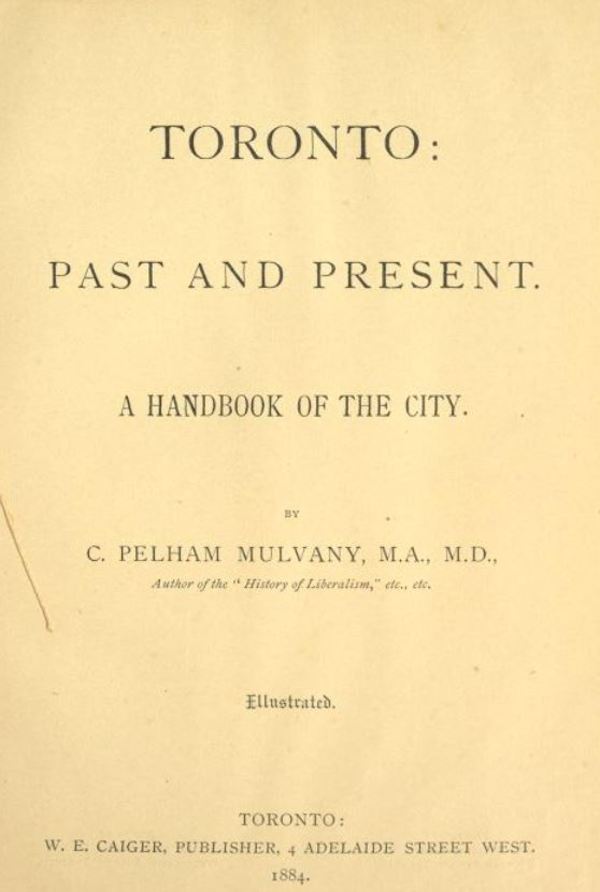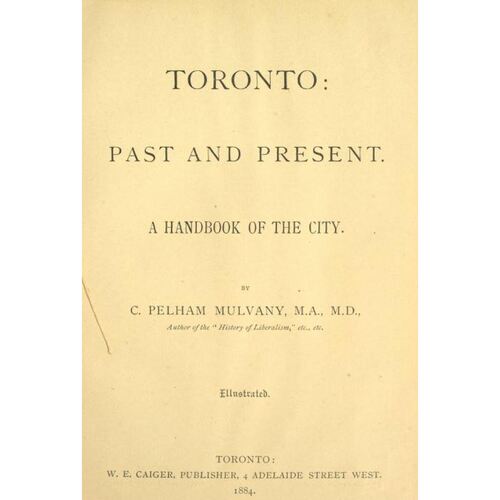
Source: Link
MULVANY, CHARLES PELHAM, Church of England clergyman, teacher, and author; b. 20 May 1835 in Dublin (Republic of Ireland), son of Henry William Mulvany, a barrister-at-law; Elizabeth Mulvany who died in childbirth in July 1880 at Toronto, Ont., was probably his wife; d. 31 May 1885 at Toronto.
Charles Pelham Mulvany entered Trinity College, Dublin, in 1850 and was elected a scholar of the house in 1854 before receiving a ba with 1st class honours in classics in June 1856. In his college years Mulvany wrote verse for the Nation, and in 1856 edited Trinity’s College Magazine; he later contributed to the Irish Metropolitan Magazine (1857–58). Following graduation he joined the Royal Navy in which he apparently served as a surgical assistant. In later years Mulvany claimed to have been a naval surgeon with an md degree, but this is improbable; certainly he never practised medicine in civilian life.
After a brief stint in the navy Mulvany immigrated to Canada about 1859. In 1866 he comes into view in Toronto when he joined the 2nd Battalion, Queen’s Own Rifles, during the Fenian scare. However, before any Fenian raid took place Mulvany moved to Lennoxville, Canada East, where he enlisted in the militia in Sherbrooke, rising to the rank of lieutenant, and joined the faculty of Bishop’s College as a lecturer in classics. On his arrival the college conferred an honorary ma degree on him in consideration of previous work on the classical forms of English verse and on medieval hymnology. In 1867 he helped establish a literary periodical entitled the Students’ Monthly. He left Bishop’s the same year to serve as principal of the Niagara High School in Ontario, but he retired from teaching altogether in 1868 to take up an entirely new career in the Church of England.
Ordained deacon by John Travers Lewis*, bishop of the diocese of Ontario, in 1868 and priest in 1872, he was licensed curate to All Saints Church, Kingston, in 1868, and later to various parishes in Lanark, Prince Edward, and Northumberland counties. Having grown weary of rural parish life, Mulvany retired from active clerical work in 1878 and moved to Toronto to take up a career as a writer.
At this juncture a veritable flood of material began to flow from his pen for Toronto’s newspapers and periodicals, particularly Rose-Belford’s Canadian Monthly and National Review. Mulvany’s initial publication in book form was a collection of Lyrics, songs and sonnets (1880), prepared jointly with Amos Henry Chandler. In 1880 he found employment with W. J. Gage and Company; there he edited the firm’s monthly Canada School Journal for two years and a Latin text by Julius Caesar (1881). By this time Mulvany’s interests had turned to Canadian history. He co-authored The history of the county of Brant, Ontario (1883) and wrote “A brief history of Canada and the Canadian people” which appeared in both the History of the county of Peterborough, Ontario (1884) and the History of Toronto and the county of York, Ontario (1885). This lengthy and error-ridden essay is an overview of Canadian political and constitutional developments written in the classic whig-liberal tradition, emphasizing the struggle for responsible government and confederation. At the time of his death, Mulvany was expanding this study into a full history of liberalism in Canada. His most important work, however, was Toronto: past and present; a handbook of the city (1884), written in the “booster” tradition to commemorate the city’s semi-centennial. As a reference source on Toronto in the 1880s the work is indispensable, containing as it does a mine of information on the city’s social, economic, and political institutions, as well as on many of its leading citizens, streets, and buildings. Mulvany’s last major publication was The history of the North-West rebellion of 1885 (1885), a hastily prepared book which appealed to the contemporary biases of most English-speaking Canadians. The author detailed the military exploits of those heroic “citizen-soldiers” who punished Louis Riel and the “half-breeds” for attempting to establish “an island of mediaevalism and of alien race in the midst of the spread of English Canadian civilization.”
C. P. Mulvany was the author of “A brief history of Canada and the Canadian people,” published in History of Toronto and county of York, Ontario . . . (2v., Toronto, 1885), I, and also in History of the county of Peterborough, Ontario . . . (Toronto, 1884), 1–209. His article, “County and town of Peterborough, Ontario,” also appears in History of the county of Peterborough . . . , 215–372. Mulvany contributed to The history of the county of Brant, Ontario . . . (Toronto, 1883) and his other historical writings include The history of the North-West rebellion of 1885 . . . (Toronto, 1885; repr. 1971) and Toronto: past and present; a handbook of the city (Toronto, 1884; repr. 1970). His poetry is found in A. H. Chandler and C. P. Mulvany, Lyrics, songs and sonnets (Toronto, 1880), and in A wreath of Canadian song; containing biographical sketches and numerous selections from deceased Canadian poets, ed. Mrs C. M. Whyte-Edgar (Toronto, 1910), 143–46. He was also translator and editor of Cæsar’s “Bellum Britannicum” . . . (Toronto, 1881).
Bishop’s Univ. Arch. (Lennoxville, Que.), College Council, Record of meetings, 1861–76; Convocation register, 1854–85; Register, 1873–90. Church of England, Diocese of Ontario, Synod, Journal (Kingston, Ont.), 1868–85. Globe, 1 June 1885. DNB. Dominion annual register, 1885: 273. D. J. O’Donoghue, The poets of Ireland: a biographical and bibliographical dictionary of Irish writers of English verse (Dublin and London, 1912; repr. Detroit, 1968).
Cite This Article
Gerald Killan, “MULVANY, CHARLES PELHAM,” in Dictionary of Canadian Biography, vol. 11, University of Toronto/Université Laval, 2003–, accessed February 25, 2026, https://www.biographi.ca/en/bio/mulvany_charles_pelham_11E.html.
The citation above shows the format for footnotes and endnotes according to the Chicago manual of style (16th edition). Information to be used in other citation formats:
| Permalink: | https://www.biographi.ca/en/bio/mulvany_charles_pelham_11E.html |
| Author of Article: | Gerald Killan |
| Title of Article: | MULVANY, CHARLES PELHAM |
| Publication Name: | Dictionary of Canadian Biography, vol. 11 |
| Publisher: | University of Toronto/Université Laval |
| Year of publication: | 1982 |
| Year of revision: | 1982 |
| Access Date: | February 25, 2026 |



